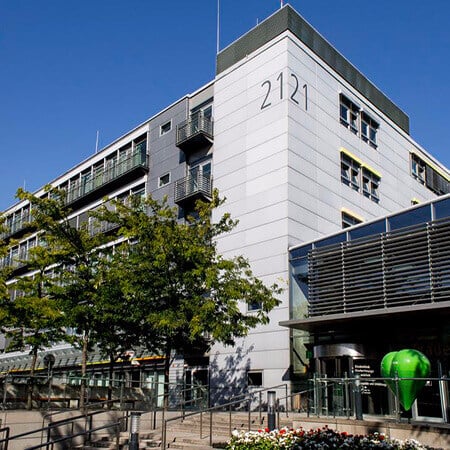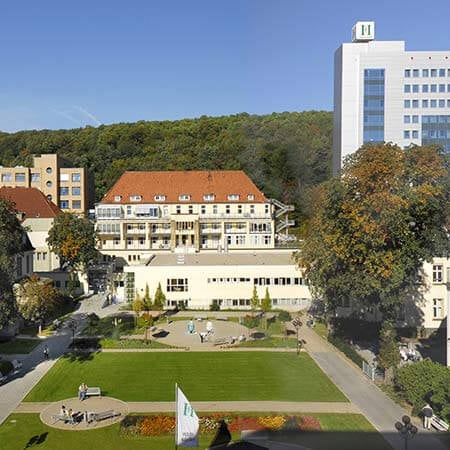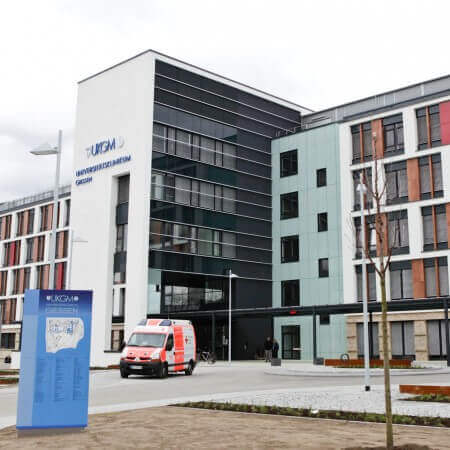Testicular embryonal carcinoma is one of the most aggressive neoplasms of these organs. Its treatment usually requires removal of the testicle with the spermatic cord, removal of retroperitoneal lymph nodes, and chemotherapy. In the advanced stage, doctors may use radiation therapy to destroy testicular cancer metastases. Despite the high grade of the tumor, in Germany it is usually possible to cure the disease even at the advanced stage. Doctors in this country perform minimally invasive surgical interventions with a low risk of complications, use robot-assisted devices and nerve-sparing techniques for preventing retrograde ejaculation.
Content
- What is embryonal carcinoma
- Diagnostics
- Features of embryonal testicular cancer treatment
- Surgical treatment
- Orchifuniculectomy
- Retroperitoneal lymphadenectomy
- Chemotherapy
- Why is it worth undergoing cancer treatment in Germany
- Treatment in Germany with Booking Health at an affordable price
What is embryonal carcinoma
Testicular germ cell tumors are rare. They account for 1-1.5% of all malignancies in men. Nonetheless, this is the most common group of neoplasms among young patients. The average age of the patients is 35 years.
Pure embryonal testicular cancer is rare – only 3% of testicular germ cell tumors. With this tumor diagnosed, the treatment is rather difficult: it is usually necessary to remove not only the testicle, but also the retroperitoneal lymph nodes, and also carry out chemotherapy. At the time of diagnosis, 20% of patients already have distant metastases, and 40% have metastatic lesions of regional lymph nodes. The five-year survival rate for embryonal testicular cancer averages 66%, but the success of treatment is largely determined by the stage at which the pathology is detected, as well as the quality of medical care.
More often, embryonal cancer is a part of mixed tumors. It is present in 40% of neoplasms. The higher the proportion of embryonal cancer, the worse the prognosis. The presence of more than 50% of embryonal cancer cells in the tumor is considered an unfavorable prognostic factor and affects the treatment tactics.
Diagnostics
Testicular germ cell tumors are usually located superficially in the scrotum. They are palpable, detectable early by patients and cause anxiety. In 92% of cases, a palpable mass in the scrotum becomes the first complaint and reason for going to a urologist, while in 8% of cases patients seek medical attention because of pain in the scrotum. It develops later, and therefore the diagnosis in such patients is established at a later stage.
Other clinical signs include:
- Enlarged lymph nodes in the groin – detected in 15% of patients.
- Fever, weakness, headache and other signs of general intoxication – detected in 12% of patients and usually appear at the advanced stage of testicular cancer.
Patients who complain of the palpable testicular mass are primarily subject to ultrasound examination. The ultrasound scan helps to identify the tumor, suggest its type, and check the condition of the lymph nodes. This is the main instrumental method by which the diagnosis is made. Testicular biopsy is usually not performed, because the material is examined after the tumor removal. Surgical interventions can be performed at all stages of the disease, even at the advanced one.
Laboratory tests help detect the levels of tumor markers in the blood:
- AFP – alpha-fetoprotein.
- hCG – human chorionic gonadotropin.
- LDH – lactate dehydrogenase.
The first two markers are specific for testicular germ cell cancer. The LDH levels also increase due to many other neoplasms. Embryonal testicular cancer is characterized by a significant increase in the levels of all tumor markers. According to their levels and dynamics, one can assume the presence of metastases, assess the effectiveness of treatment, and timely detect a recurrence of the neoplasm.
If the doctor suspects the presence of metastases, the patient needs a complete examination of the body using instrumental methods:
- Chest x-ray.
- CT scan.
- MRI.
- PET.
On the basis of instrumental diagnostics, it is possible to establish the clinical stage of testicular cancer. However, more accurate staging is done after surgery, when the doctor resects the testicle and retroperitoneal lymph nodes.
Features of embryonal testicular cancer treatment
The main treatments for testicular cancer are as follows:
- Surgery.
- Chemotherapy.
- Radiation therapy.
Radiation therapy is more important for patients with seminoma. As a rule, it is not used for embryonal carcinoma. If radiation therapy is used, it is mainly at the advanced stage for controlling distant metastases. Most often, metastatic foci in the brain are irradiated, as they can cause complications. But if complications do not threaten the patient, radiation can be avoided, since chemotherapy can usually reduce or completely eliminate metastases.
Surgery is a key treatment for embryonal cancer. It can be performed at all stages of the disease. The doctor can remove only the testicle with the spermatic cord or additionally perform a retroperitoneal lymphadenectomy. Since embryonal cancer is an aggressive tumor, the stage of the surgical procedure aimed at removing the lymph nodes is desirable even at an early clinical stage. After the lymph node dissection, the doctor can determine the exact pathological stage in order to plan the optimal treatment for testicular cancer.
Chemotherapy is used for most patients with embryonal cancer, but it may not be used at the first stage if the doctor removed the retroperitoneal lymph nodes, and there were no metastases in them. Such patients require careful monitoring of the tumor marker levels.
Once treatment is completed, all patients should be monitored by urologists or oncologists. Doctors periodically conduct tumor marker tests for timely relapse detection. After quality treatment, most patients do not have any relapse. But in some patients it happens, and thanks to tests, it can be detected long before the manifestation of clinical signs. Embryonal carcinoma is characterized by an increase in the AFP and hCG levels, therefore, with a relapse, these hormones are determined in the blood. The doctor may examine the patient with radiation methods in order to detect recurrent tumors.
Even after the successful testicular cancer treatment, the patients will have to be periodically tested for tumor markers throughout their life. Although most relapses occur in the first 3-5 years after treatment, the literature describes cases when they occurred much later: 10-20 or more years after surgery and chemotherapy.
Surgical treatment
The surgical treatment of embryonal testicular cancer involves two operations:
- Orchifuniculectomy – removal of the testicle with the spermatic cord.
- Retroperitoneal lymphadenectomy – removal of lymph nodes.
These surgical interventions can be performed in one or two stages.
Orchifuniculectomy
Orchifuniculectomy is aimed at removing the primary tumor. The doctor makes a small incision above the pubis, ties the spermatic cord so that the tumor does not spread through the vessels, and resects the tissue. This is a simple and non-traumatic surgical intervention, which does not require a long recovery. The doctor may implant a silicone prosthesis in the site of the testicle. It is unable to produce sperm and male hormones, but it restores the shape of the scrotum.
Orchifuniculectomy may have the following consequences:
- Low testosterone levels.
- Decrease in semen quality.
With testosterone deficiency, men can receive hormone replacement therapy. Patches or injections are usually used. Pills are not a reliable source of testosterone, while many oral medications damage the liver. However, modern injectable forms of male hormones are very convenient, because they can be injected every few weeks or even every few months.
Most men with testicular cancer are between the ages of 20 and 40. Therefore, they worry about their reproductive function after surgery. It will inevitably suffer after the surgical intervention. Nonetheless, patients can donate sperm in advance and store it frozen indefinitely. In the future, assisted reproductive technologies can be used to conceive a child.
Retroperitoneal lymphadenectomy
Lymph node removal surgery is more traumatic and more likely to cause complications, but it is often required for embryonal testicular cancer, as it contributes to the achievement of two important goals:
- Establishing the exact stage of testicular cancer.
- Reducing the risk of regional recurrence.
Even at the stage of radiation diagnostics, the doctor determines the clinical stage of testicular cancer, but the pathomorphological stage is more accurate. It can be determined after removal and examination of the lymph nodes in the laboratory. Metastatic foci are often found even in patients who, according to the CT scan, did not have any signs of metastasis, and this affects the treatment tactics.
Typically, retroperitoneal lymphadenectomy is a traumatic surgical procedure performed through a large incision. After its performance, the patient has to recover for a long time. But doctors in Germany use laparoscopic access. The lymph nodes are removed through several short incisions. As a result, patients lose less blood, spend less time in the hospital, and recover faster after surgery.
The risk of complications after lymphadenectomy in different hospitals is 5-10%. When performing the operation, the surgeon can damage the nerves responsible for ejaculation. Therefore, the most common complication of retroperitoneal lymphadenectomy is retrograde ejaculation. Normally, ejaculate should pass through the urethra into the external environment, but due to nerve damage, it enters the bladder. This makes natural conception impossible, and men who want to have children have to resort to assisted reproductive technologies. If you are undergoing treatment in Germany, the risk of retrograde ejaculation is minimal, as doctors use nerve-sparing techniques.
Chemotherapy
Most patients with embryonal testicular cancer receive chemotherapy. It is carried out after surgery if:
- Doctor did not remove the retroperitoneal lymph nodes.
- Metastases were found in the removed lymph nodes.
- Tumor marker levels remain elevated.
Sometimes chemotherapy for embryonal testicular cancer is started before surgery. This is possible when metastases are detected by clinical methods. This chemotherapy for testicular cancer is called induction chemotherapy.
The treatment regimen and the number of cycles depends on the prognostic group in which the patient is included according to the results of the diagnostic examination. The prognosis can be good, bad, or intermediate. Typically, patients with embryonal testicular cancer receive 3-4 cycles of chemotherapy.
Why is it worth undergoing cancer treatment in Germany
Germany is a country with a high level of medicine. It offers advanced technologies, innovative treatments for oncological diseases, and hospitals here employ the best specialists in urology and oncology.
There are several reasons for you to undergo cancer treatment in Germany:
- Minimally invasive laparoscopic surgery for retroperitoneal lymph node removal.
- Some hospitals in Germany perform cancer surgery using a robot-assisted system, which makes the surgical procedure even safer.
- Nerve-sparing techniques allow maintaining normal ejaculation after retroperitoneal lymphadenectomy.
- Advanced radiation therapy options that are used not only in patients with seminoma, but they are used in the last stage of embryonal cancer.
- Cancer can be cured even in patients with metastatic disease.
- Modern chemotherapy regimens according to international protocols.
- Quality care, symptomatic treatment, adequate pain relief, comfortable conditions in German hospitals.
Germany ranks among the best in the world for the quality of cancer treatment. Advanced medicine and highly qualified doctors provide accurate diagnosis, minimally traumatic, safe and effective treatment.
Treatment in Germany with Booking Health at an affordable price
To undergo embryonal testicular cancer treatment in one of the German hospitals, you can use the services of the Booking Health company. On our website, you can find out the cost of treatment and compare prices in different hospitals in order to book a medical care program at a favorable price. Treatment in German hospitals will be easier and faster for you, and the cost of treatment will be lower.
You are welcome to leave your request on the Booking Health website. Our specialist will contact you and provide a consultation on treatment in Germany. Booking Health will fully organize your trip to this country. We will provide the following benefits for you:
- We will select the best German hospital, whose doctors specialize in embryonal testicular cancer treatment.
- We will solve the problem of the language barrier, and we will provide communication with the doctor of the German hospital.
- We will reduce the waiting time for the medical care program. You will undergo treatment on the most suitable dates.
- We will reduce the price. The cost of treatment in Germany will be reduced due to the lack of overpricing and additional coefficients for foreign patients.
- We will take care of all organizational issues: we will prepare documents, meet you in Germany and take you to the hospital, book a hotel, and provide interpreting services.
- We will prepare a program and translate medical documents. You do not have to repeat the previously performed diagnostic procedures.
- We will help you keep in touch with doctors after the completion of treatment in Germany.
- We organize additional diagnostic examinations and treatment in the German hospital.
- We will buy medicines in Germany and forward them to your native country.
Your health will be in the safe hands of the world's leading doctors. The Booking Health specialists will help reduce the cost of treatment, organize your trip to the German hospital, and you can fully focus on restoring your health.
Authors: Dr. Vadim Zhiliuk, Dr. Sergey Pashchenko













